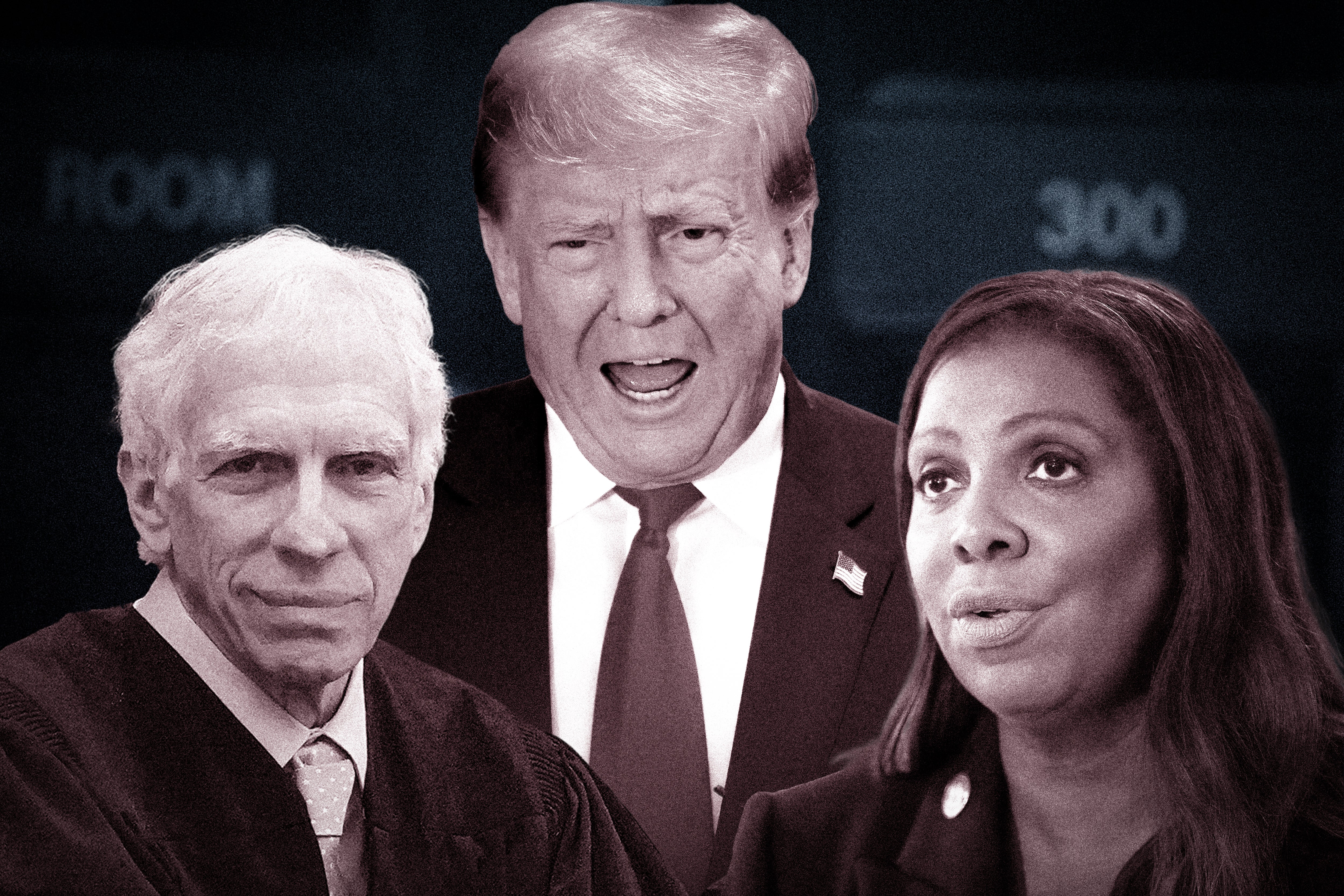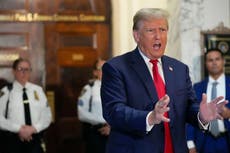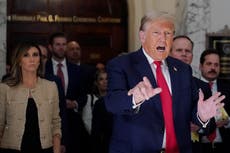Trump’s first week in court can’t stop a trial with his business at stake
His first trial ahead of several of them started with a gag order, witnesses to fraud and a preview of the courtroom battles to come, Alex Woodward reports


As he left in the middle of the third day of a trial he was voluntarily attending, Donald Trump held another one of his hallway press conferences inside a Manhattan courthouse in front of two rows of cameras staged outside the third-floor courtroom’s door.
“I’m here, stuck here, and I can’t campaign,” he said.
He wasn’t, and he could have, but after stewing in frustration from the defence table for roughly 12 hours across the first three days of a trial on allegations of fraud, he unloaded his grievances and claimed once again that the latest legal threat against him – one that could imperil his business empire – joins a far-reaching political conspiracy to keep him away from the White House.
“I’d rather be right now in Iowa, I’d rather be in New Hampshire, South Carolina, or Ohio, or a lot of other places,” said Mr Trump, referring to a campaign trail ahead of the 2024 Republican nomination. “But I’m stuck here, because I have a corrupt attorney general who communicates with the [US Department of Justice] in Washington to keep me nice and busy, because I’m beating Biden in the polls by a lot.”
After he left, New York Attorney General Letitita James – who sued Mr Trump, his adult sons, chief associates and business entities – told reporters that “the Donald Trump show is over”.
After three days of out-of-court rage and compulsive name-calling that prompted a judge to issue a gag order against him from the bench, and after months of Mr Trump’s harassment targeting the prosecutors and judges presiding over his many criminal and civil cases, Ms James broke her silence.
“I will not sit idly by and allow anyone to subvert the law,” Ms James added. “Lastly, I will not be bullied. … We are confident justice will be served.”
After all his bluster, he failed to stop the trial from moving forward. On the fifth day of the trial, after Mr Trump had fled New York City for his Mar-a-Lago compound in Florida, his attorneys lost an attempt to pause the trial altogether while they continue to appeal a judge’s order that threatens to cancel his business certificates in the state.
New York Superior Court Judge Arthur Engoron has allowed a trial to last through the Friday before Christmas, and the attorney general’s office has prepared a long list of witnesses prepared to testify to the scale of alleged fraud outlined in her lawsuit.
In a preview of his public response to the upcoming criminal cases against him, the former president’s campaign has sent out more than two dozen fundraising messages within the first week of his trial painting himself as a victim of political persecution, sharing “opposition research” of his opponents, and feeding a content mill of counterprogramming to his supporters who have tuned out the evidence against him.
In courtrooms across the country, the litigious former president’s small army of attorneys has relied on his time-tested strategy to delay at all costs, filing several motions to block cases from moving forward as Mr Trump pursues the presidency next year.
But they lost their attempt to delay Mr Trump’s civil case in New York days before his convicted former associates – Allen Weisselberg and Michael Cohen – prepare to take the stand.
Mr Trump, too, has vowed to take the stand. When, however, is a different story, as the former president’s busy campaign schedule collides with several criminal and civil cases against him.
Trump’s longtime accountants point fingers back at him
The attorney general’s team has argued that Mr Trump and his companies had the last word when it came to preparing his statements of financial condition, the documents at the centre of the case allegedly used to fraudulently obtain benefits that helped the former president sustain and grow his empire, with his outside accountants relying on the figures provided to them.
Donald Bender, a now-retired accountant for Mazars USA who worked closely with the Trumps for years, was the first witness in the trial against his former boss. In lengthy questioning across nearly three days on the witness stand, he testified that it was the Trump Organization that provided the data used to assemble those financial statements.
Mr Bender said that he learned about missing appraisals after Manhattan prosecutors questioned him during their separate investigation into Mr Trump’s business.
Defence attorneys for Mr Trump and his co-defendants tried to show that missing information or incomplete pictures of his financial condition were mistakes made by Mr Bender.
Former Trump Organization controller Jeffrey McConney testified that he was responsible for those statements from 2011 to 2017, but he distanced himself from the role that Mazars played with the organisation’s statements.
“We as the Trump Organization didn’t prepare the statement,” said Mr McConney, who also is among co-defendants in the lawsuit.
He said he worked on those statements with Allen Weisselberg, the longtime chief financial officer of the Trump Organization who pleaded guilty to tax crimes in a separate Trump-connected fraud scheme.
Mr McConney, however, admitted that Mr Trump himself would seek a final review of the compilation of statements of financial condition before they were submitted. One document included a handwritten note for “DJT TO GET FINAL REVIEW”.
Evidence of fraud or just ‘real estate’
In his ruling last month, Judge Engoron determined that a trial wasn’t necessary to prove that Mr Trump fraudulently inflated his assets in statements of financial condition submitted to banks and insurers for favourable rates and other benefits.
In court, he stressed that the trial is not an opportunity to relitigate what has already been decided; the judge ruled that Mr Trump is liable for fraud, and the trial instead will determine what punishments, if any, Mr Trump, his adult sons and his associates will face, and whether Ms James will succeed on six other counts she alleges in her lawsuit, including insurance fraud and conspiracy.
During opening statements, counsel for the attorney general’s office, Kevin Wallace, argued that those values for his assets – including star properties like his triplex inside Trump Tower and 40 Wall Street – were arbitrarily determined to reach a target figure that would approximate Mr Trump’s net worth.
Attorneys for Mr Trump, however, argued that those assets had no objective values, and that using favourable determinations is just the business of real estate, not fraud.
Mr Trump and his attorneys also argued that attached “disclaimers” on financial statements served as warnings that the documents weren’t necessarily reliable, effectively blaming financial institutions for believing them without investigating on their own.
In his pretrial testimony, Mr Trump argued that those valuations would “never be taken seriously”, and that so-called disclaimers on such documents meant that “the statement is worthless” and “means nothing” without further review. Judge Engoron already had rejected that defense in his pretrial ruling.
A ‘gag order’ delivered from the bench directly to Trump
During a break in the trial on 2 October, a post on his Truth Social account falsely accused court clerk Alison Greenfield of being Senate Majority Leader Chuck Schumer’s “girlfriend” and posted a link to her Instagram account.
He baselessly accused Ms Greenfield of “running the case against” him. Ms Greenfield has been seated to the judge’s right throughout the trial, directly in front of Mr Trump and his legal team.
The post was deleted a short time later, but it brought the court to an apparent standstill and enraged the judge, who had ordered Mr Trump to remove the post.
Following a long break in the trial on 3 October, Judge Engoron said that “one of the defendants posted from a social media account a disparaging, untrue and personally identifying post about a member of my staff”.
“Personal attacks on members of my court staff are unacceptable, inappropriate and I will not tolerate them under any circumstances,” Judge Engoron said. He added that he warned counsel one day earlier but his warning “was disregarded.”
“Consider this statement a gag order from posting, emailing or speaking publicly about any members of my staff,” he said.
He warned that Mr Trump could face “serious sanctions” if he further violates the judge’s order.
The order was aimed at Mr Trump – who was forced to listen to the judge’s order in an open court in front of his attorneys, attorneys for Ms James and the dozens of journalists and members of the court behind him – but it applies broadly to all parties.
It’s also an order that other judges are considering after federal and state prosecutors issued warnings about Mr Trump’s threatening statements that have galvanised his supporters and fuelled waves of abuse and threats directed at prosecutors, judges and jurors.
In a video statement published on her social media channels, Ms James outlined the testimony thus far in the case, adding that “meanwhile, the defendants continued to challenge our case, falsely claiming the underlying law is unconstitutional, and other baseless claims, including that this a witch hunt.”
“Dangerous and racist comments will not deter me. The laws of this great state and nation apply equally to everyone, even Donald Trump,” she added. “It is my duty and my responsibility to ensure that the law is enforced and upheld. And I refuse to back down or to be bullied.”
A timeline for dissolving Trump’s businesses
Judge Engoron has called on Mr Trump’s legal team and the attorney general to offer up some suggestions for independent receivers to oversee the dissolution of Mr Trump’s companies by 26 October.
His orders called on Mr Trump’s attorney to turn over a list of those companies and inform the monitor already overseeing Trump Organizaton transactions about any third parties who are involved.
On 6 October, an appellate judge at the New York Supreme Court blocked Mr Trump’s last-ditch effort to pause the trial as his attorneys challenged Judge Engoron’s order that would dissolve his business in the state.
But the judge agreed to pause the sanctions ordered in Judge Engoron’s decision.
Attorneys for Mr Trump warned that the sanctions against him and his business empire would “unquestionably inflict severe and irreparable harm” to the parties and “employees who depend on the affected entities for their livelihoods.”
The termination of his sprawling business assets “renders impossible the lawful operation of multiple businesses and threatens termination of hundreds of New York employees without any jurisdiction or due process,” according to the motion.
The court “clearly does not comprehend the scope of the chaos its decision has wrought,” they argued.
Join our commenting forum
Join thought-provoking conversations, follow other Independent readers and see their replies
Comments






Bookmark popover
Removed from bookmarks